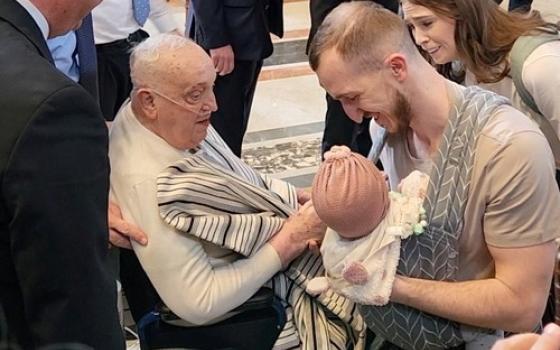CATHOLIC MOREAL THEOLOGY IN THE UNITED STATES
By Charles E. Curran
Georgetown University Press, $26.95
Fr. Charles Curran is a priest of the diocese of Rochester, N.Y., who is now a professor at Southern Methodist University in Dallas. One of the nation's most respected scholars in the field of ethics, Curran is also a Catholic moral theologian.
Curran is unusual. Too many intellectuals serve narrow factional interests, be they national, political, economic or religious, all the while denying that social and political responsibility has anything to do with their pursuit of truth. Scholarship has become highly specialized and professionalized. Questions of social and political responsibility are often relegated to matters of personal preference or, at best, subjects of interdisciplinary dialogue.
Too few Catholic scholars, including theologians, regard the life and work of the church as relevant to their intellectual and cultural work. Curran, in contrast, takes all these responsibilities seriously.
As a young moral theologian trained by some of the best Catholic theologians in the world during the excitement of the Second Vatican Council, Curran quickly won a solid reputation among his peers. Nevertheless, in 1966 he was denied tenure at The Catholic University of America in Washington until public protest by students and faculty forced a reversal of that decision.
Two years later he helped organize public dissent by theologians to the papal encyclical Humanae Vitae and its total ban on contraception. Afterward he was a major target for well-organized conservative factions in the United States and in the Vatican. Bishops succeeded in firing Curran from his tenured post at Catholic University, and that decision was upheld by the civil courts. No Catholic university offered him a post, and since that time Curran has taught at Southern Methodist while continuing his remarkably prolific scholarly and popular writing on moral questions.
In many ways, this history of American Catholic moral theology is a summary of Curran's work. The book provides a reliable introduction to the major figures and central issues in the development of Catholic moral theology in the United States, and Curran always saw his work within a historical framework like this. His chapters on the period of his own work before, during and after Vatican II are an invaluable summary of the intellectual issues that have divided and damaged the church. Curran is scrupulously fair to his critics, so that the reader gets an evenhanded presentation of the questions of method and substance that set his work and that of other reformers like Jesuit Fr. Richard McCormick apart from serious scholarly opponents and the hierarchical leaders who came to dominate Vatican offices.
At least three areas deserve special consideration in the context of current debates within the church. First, Curran's method, which so disturbs his critics, requires attention to experience. This includes personal experience: Before pontificating about sex, it would be a good idea to listen to people's experiences, as the Vatican birth-control commission did, before recommending change in church teaching. But it also includes historical experience, which involves the Vatican II idea of thinking historically and reading the "signs of the times.” Rejecting that approach has serious pastoral and political consequences, as can be seen in the sad story of Catholic treatment of birth control, sex education, homosexuality and even abortion. If experience doesn't count, it is hard to win those debates, even harder to help people find their way in daily life.
Second, in his early career Curran was a very popular speaker at clergy continuing-education sessions. Some bishops worried that he was influencing their priests, but in fact it was a two-way street, and Curran learned from their pastoral experience and tried to find ways to help them bring the Gospel and the wisdom of the Catholic tradition to life in their ministries. It would be hard to count the cost to American Catholic intelligence brought about by severing theology, or at least ecclesiastically acceptable theology, from pastoral practice.
Third, over the course of his career Curran has extended his interest from issues of personal morality to embrace questions of social morality. He captures the intimate relationship between the two. He would admit that his integration of the two usually segregated fields is far from complete, but his achievement is important. In college and university programs as well as in education generally, personal ethics, centered on sexuality, is separate from and generally treated as more important than social ethics. This undoubtedly has something to do with the failure of Catholic social teaching to inspire renewal. Even when one takes a course or attends a workshop on medical ethics, or business ethics or other vocationally oriented areas, the focus is almost always on personal integrity (what must I not do?) rather than on social responsibility (how can I best use my gifts for the building up of God's world and God's people?). Curran is one of the few moral theologians to open up the question of how personal and social morality are connected, and for this it is possible his work will be most influential for years to come.
This book and Curran's work generally deserve the attention of all those Catholics who believe that history matters, and that the church finds its mission in that essential framework given its best expression in Vatican II's "Pastoral Constitution on the Church in the Modern World.” As many have turned away from the promise of the council, Curran has done as much as any American Catholic to keep hope alive.
(David O'Brien is founding director of the Center for Religion, Ethics and Culture at the College of the Holy Cross, Worcester, Mass.)



